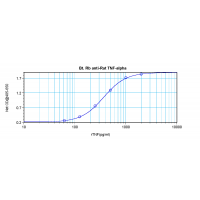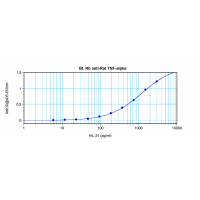
To detect Rat TNF-alpha by direct ELISA (using 100 ul/well antibody solution) a concentration of 0.25 – 1.0 ug/ml of this antibody is required. This biotinylated polyclonal antibody, in conjunction with compatible secondary reagents, allows the detection of at least 0.2 – 0.4 ng/well of recombinant Rat TNF-alpha.

To detect Rat TNF-alpha by sandwich ELISA (using 100 ul/well antibody solution) a concentration of 0.25 – 1.0 ug/ml of this antibody is required. This biotinylated polyclonal antibody, in conjunction with ProSci’s Polyclonal Anti-Rat TNF-alpha (XP-5286) as a capture antibody, allows the detection of at least 0.2 – 0.4 ng/well of recombinant Rat TNF-alpha.

